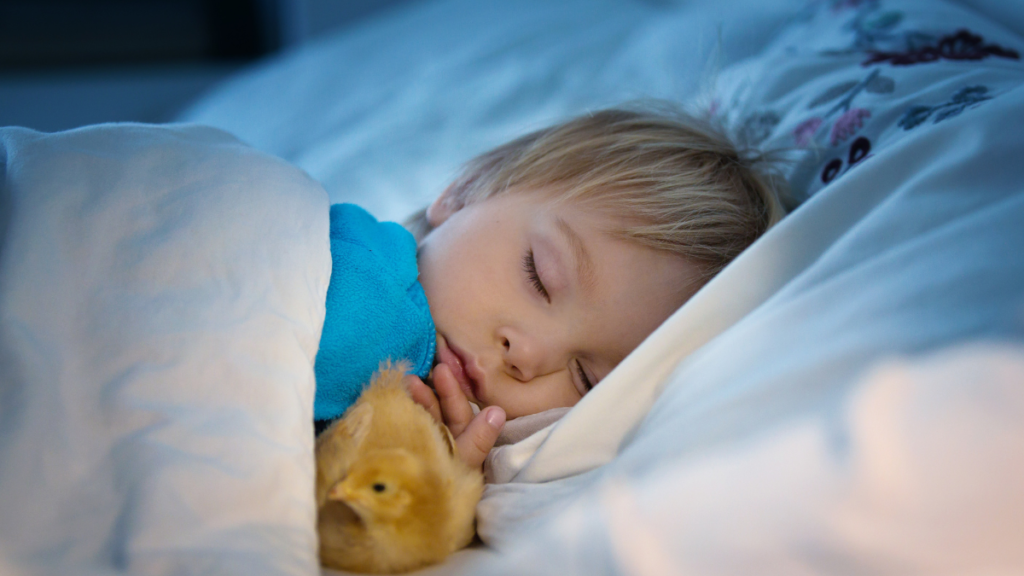
Let’s start at the beginning! There are two types of nocturnal enuresis, otherwise known as bedwetting. These two types are known as primary and secondary. Primary enuresis refers to a child that has never had control of their bladder overnight- think about a 3 year old that just recently learned how to use the potty. Secondary enuresis, however, is in reference to a child that has previously gained bladder control overnight for at least 6 months, but is now wetting the bed again. Knowing the difference between the two can help you figure out what the next steps are.
It is important to look at the “why” before looking at what you, as the parent, can do about it.
The link between the brain and the bladder is not fully formed in infancy and toddlerhood. Daytime control comes with learning and developmental changes. Night time control on the other hand is not really “control” that is up to the child. Up until the point of potty training, a child’s bladder releases the urine when it feels full and the brain-bladder link needs time to develop more.
Keep in mind that research shows approximately 15 percent of children still wet the bed at age 5.
Even while knowing that physiological factors are at play, keep in mind there are various reasons that could be the culprit of bedwetting. Some of the most common reasons are:
Genetics: Studies have shown an almost 40 to 70 percent increase in likelihood of bedwetting for a child if there is a family history of bedwetting at a late age (older than 7). This could be a conversation you have with your own parents or grandparents to see if they dealt with a similar situation.
Time: It takes time for a child’s kidneys to mature. Research reveals that boys are more likely to wet the bed than girls by 2 to 3 times. The kidneys make more urine at night and when the brain-bladder connection is still not mature, this is where accidents can happen more frequently. In these cases where it is a physiological issue, it just takes time for the child to develop more control of their bladder. While it is awesome for a child to stay dry during the day and night-time, these do not always go hand in hand at the same time.
Sleep: Many assume that wetting the bed is directly correlated to deep sleep. While this is true in some instances, there is also a reason to look at sleep disturbances such as external stimuli, snoring, or frequent wake ups playing a role.
Stress: Big changes can impact a lot of areas of a child’s life. These life changes could look like adding a new sibling to the family or moving. Stress tends to have a notable influence after the child has had a period of time being dry overnight.
Medical: There are multiple medical reasons behind these overnight occurrences as well. One of the most prominent would be constipation. Not many people realize how close the bowel and bladder are. When your child’s bowel is full, it places pressure on their bladder which can lead to incontinence. Other medical issues that would need further evaluation by a healthcare professional would be a urinary tract infection (UTI), hormonal imbalances, or Type 1 Diabetes.
Remedies:
Now that we have looked at the reasons behind “why” bedwetting occurs, we can dive into what the next steps are.
First and foremost- recognize that your child is not wetting their bed on purpose. Remember, this happens when they are sleeping. Just like other things while sleeping- they do not have direct conscious control over this. For older toddlers this can be an area that makes the child self-conscious or ashamed. You will want to be aware of how you and others approach the topic when speaking with them as they are likely trying to navigate the emotions with it as well.
Minimizing Fluid Intake in the Evenings: There has not been a lot of evidence to show that this is a reliable method, but minimizing fluid intake for 45 minutes to one hour before bedtime has been shown to help some kids overnight.
There is no shame in utilizing diapers or pull ups. Especially in the time right after your toddler starts learning how to use the potty! For some, nighttime dryness comes right away but for many others, that brain-bladder link has not developed for overnight dryness. I personally take this time to use up the last of the diapers. If your child is not okay with wearing diapers overnight, that is okay! You could try using a pull up or even a cloth diaper. If your toddler is persistent that they don’t want to wear anything but their underwear, this is where mattress protectors come in handy.
One trick to help with the middle of the night bed changes would be to utilize a waterproof mattress cover. I learned a few years ago a helpful trick of doing four layers- 1) mattress cover 2) fitted sheet 3) mattress cover 4) fitted sheet. This makes it so you can just take off the top two layers and not have to wrestle with putting a whole new set of sheets on in the middle of the night.
Another option if it works for you and your family would be to go in in the evening and have them go to the potty once more. This would not be a recommended course of action for a child that has a difficult time going back to bed though!
Time… Remember, this will not be forever. If the problem persists beyond seven years old or you have any questions about the bedwetting being linked to a medical issue- please reach out to a qualified medical professional.
© 2023 All rights reserved Baby & Toddler - part of parent promotions